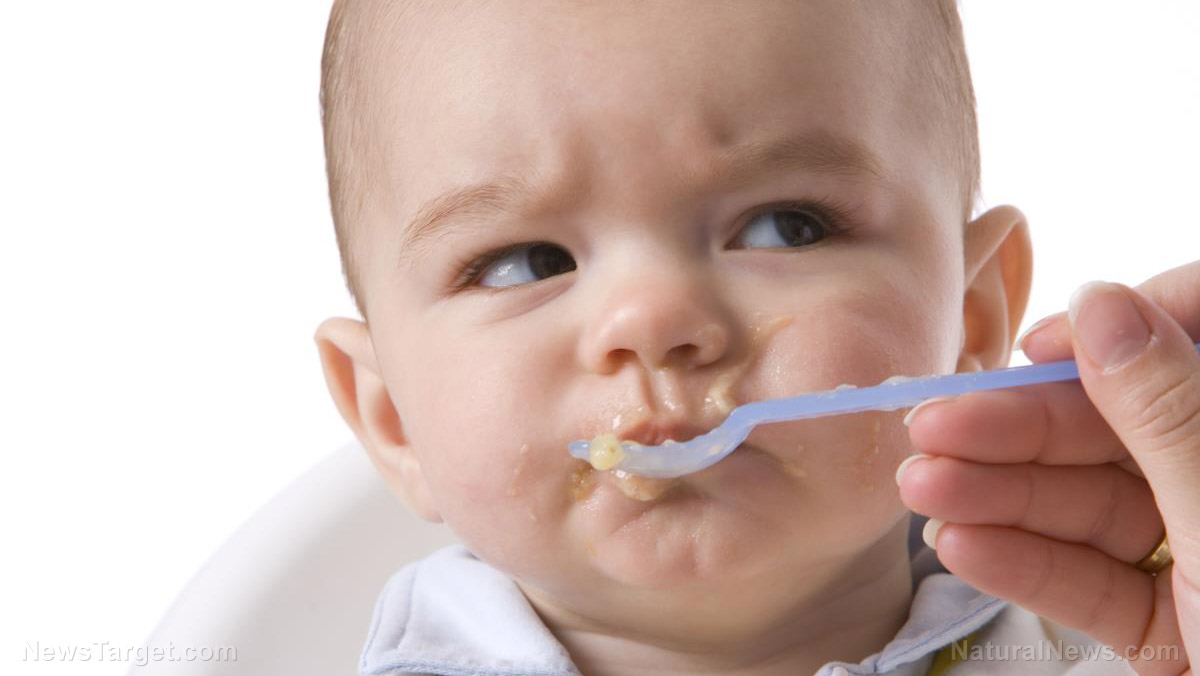
Advertisement
A shocking study has found that 95 percent of baby foods tested contained heavy metals. Researchers tested more than 160 baby foods sold in the U.S. – finding that these had one or more toxic metals. Food with the highest risk of heavy metal exposure included rice-based foods, carrots, sweet potatoes and fruit juices.
The anti-neurotoxin group Healthy Babies Bright Futures (HBBF) – composed of scientists, organizations and donors – commissioned the study. HBBF’s 2019 study looked at 168 baby foods including those manufactured by Gerber, Beech-Nut and Earth’s Best. These foods were tested for arsenic, cadmium, lead and mercury.
According to the study findings, one in four baby foods contained these four toxic substances. Only nine of the 168 foods tested were devoid of these heavy metals. Furthermore, the baby food samples tested registered a high amount of lead, another toxic metal. One in five samples had more than 10 times the legally mandated amount of lead. Most public health experts endorse a lead limit of one part per billion in food, albeit agreeing that no level of lead in food is safe.
“Even in the trace amounts found in food, these contaminants can alter the developing brain and erode a child’s IQ. The impacts add up with each meal or snack a baby eats,” the HBBF report said.
Baby foods made from rice contain the most toxic form of arsenic
Rice snacks, infant rice cereal, teething biscuits and rice rusks were among the most toxic baby foods the report named. “These popular baby foods are not only high in inorganic arsenic, … but also are nearly always contaminated with all four toxic metals,” it continued.
Arsenic naturally occurs in the Earth and can be found in air, food, soil and water. However, it can be extremely deadly in its inorganic form and at high levels. Previous studies have suggested that arsenic exposure of babies, even at low levels, can be detrimental to their cognitive skills. A 2004 study involving Bangladeshi children found that those exposed to arsenic in drinking water had lower test scores.
The report mentioned that rice rapidly absorbs arsenic from the soil and water compared to other grains. It also said rice retained more arsenic from the soil just like carrots and sweet potatoes. Infant rice cereal is often fed to babies as their first solid food due to its mild flavor, ease of digestion and iron content. However, feeding rice to babies exposes them to the dangers of toxic arsenic.
The researchers called on manufacturers of baby food to make its efforts to reduce heavy metals more stringent. Among the steps the study authors suggested were sourcing rice from field with lower soil arsenic levels. In addition, they also called on the Food and Drug Administration (FDA) to use its authority for this purpose. While the authors acknowledged the FDA’s role in minimal levels of heavy metal in food, they said the agency should adopt stricter guidelines.
Study author and HBBF Research Director Jane Houlihan said in a statement: “When FDA acts, companies respond. We need the FDA to use [its] authority more effectively, and much more quickly, to reduce toxic heavy metals in baby foods.”
Alternatives to commercial baby foods with heavy metals
The HBBF report looked at five common baby foods and suggested alternatives with less heavy metal content. For puff snacks commonly made of rice, the authors suggested using rice-free snacks that had 93 percent less metal content. You can substitute frozen banana or chilled cucumber, with 91 percent less metal content, for teething biscuits and rice rusks. Infant rice cereal could be replaced with other variants such as multi-grain and oatmeal. These alternatives for rice cereal contained 84 percent less metals.
Water and milk were safer alternatives for fruit juices containing arsenic and lead: Tap water specifically had 68 percent less heavy metals than fruit juice. The study authors advised giving a variety of vegetables to babies, not just limited to carrots and sweet potatoes.
The American Academy of Pediatrics also advised spacing out sweet potatoes and carrots to avoid consuming high levels of cadmium or lead. It also advised replacing fruit juice with water or milk, depending on the child’s age and the advice of a medical professional.
According to pediatrician Dr. Tanya Altmann, the best first foods for infants include avocado, pureed vegetables, peanut butter oatmeal and salmon. “They all provide important nutrients babies need, help develop their taste buds to healthy food and may decrease food allergies.”
Altmann added that she has not been recommending rice cereal for babies’ first food for a number of years now. She explained that meat is a better source of iron and zinc compared to rice.
Check out CleanFoodWatch.com to read about safer alternatives for your child’s first foods!
Sources:
HealthyBabyFood.org [PDF]
Advertisements







